
Józef Haller von Hallenburg was a lieutenant general of the Polish Army, a legionary in the Polish Legions, harcmistrz, the president of the Polish Scouting and Guiding Association (ZHP), and a political and social activist. He was the cousin of Stanisław Haller.
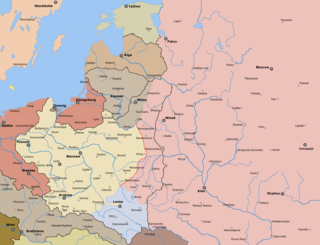
The Polish–Ukrainian War of November 1918 and 1919 was a conflict between the Second Polish Republic and Ukrainian forces. The conflict had its roots in ethnic, cultural and political differences between the Polish and Ukrainian populations living in the region both as successor states of the dissolved Russian and Austrian empires. The war started in Eastern Galicia after the dissolution of the Austro-Hungarian Empire and spilled over into Chełm Land and Volhynia (Wołyń) regions formerly belonging to the Russian Empire, which were both claimed by the Ukrainian State and the Ukrainian People's Republic. Poland re-occupied the disputed territory on 18 July 1919.

Roman Józef Abraham was a Polish cavalry general, commander of Wielkopolska Cavalry Brigade during German and Soviet Invasion of Poland in September 1939, in Battle of Bzura commander of Polish cavalry. During the Second Republic, he was Brigadier General and, for a short period – from 1930 to 1931 – Abraham was also a member of the Parliament.

Tomasz Stefan Arciszewski was a Polish socialist politician, a member of the Polish Socialist Party and the 31st Prime Minister of Poland, 3rd Prime Minister of the Polish government-in-exile in London from 1944 to 1947 during which the government lost the recognition of the Western powers.

The Polish Military Organisation, PMO was a secret military organization which formed during World War I (1914-1918). Józef Piłsudski founded the group in August 1914; it adopted the name POW in November 1914. It aimed to gather intelligence and to sabotage the enemies of the Polish people. Piłsudski used the POW to act independently from his cautious Austro-Hungarian supporters, and it became an important, if somewhat lesser known, counterpart to the Polish Legions. Its targets included the Russian Empire in the early phase of the war, and the German Empire later. Its membership rose from a few hundred in 1914 to over 30,000 in 1918.
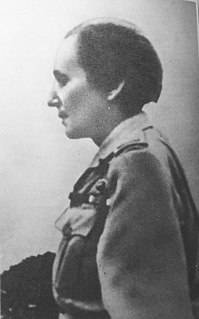
Major Wanda Gertz was a Polish woman of noble birth, who began her military career in the Polish Legion during World War I, dressed as a man, under the pseudonym of "Kazimierz 'Kazik' Żuchowicz". She subsequently served in the Ochotnicza Legia Kobiet of the Polish Armed Forces during the Polish–Soviet War. In the interwar period she became a reserve officer but faced discrimination and was stripped of her officer rank. She worked closely with Marshal Piłsudski and remained an activist in the cause of women in the military.

The Battle of Lemberg took place from November 1918 to May 1919 and was a six-month long conflict in what is modern-day Ukraine. The battle was fought between attacking forces of the West Ukrainian People's Republic and the local Polish civilian population, assisted later by regular Polish Army forces for the control over the city of Lviv, in what was then eastern part of Galicia and now is western part of Ukraine. The battle sparked the Polish-Ukrainian War, ultimately won by Poland.
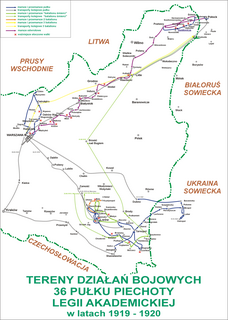
The 36th Infantry Regiment of the Academic Legion was a Polish military unit. Initially made up of students from the University of Warsaw and the Warsaw University of Technology, it fought with distinction in the Polish-Bolshevik War, the Polish Defensive War and in the Warsaw Uprising.

Brigadier General Mieczysław Makary Smorawiński (1893–1940), was a Polish military commander and officer of the Polish Army. He was one of the Polish generals identified by forensic scientists of the Katyn Commission as the victim of the Soviet Katyn massacre of 1940.

Władysław Filipkowski was a Polish military commander and a professional officer of the Polish Army. During World War II he was the commanding officer of the Armia Krajowa units in the inspectorate of Lwów and the commander of the Lwów Uprising. For his merits he was promoted to the titular rank of generał brygady.
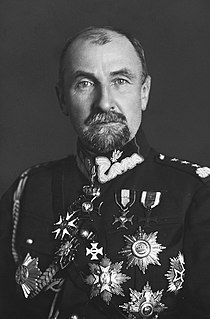
Count Tadeusz Jordan-Rozwadowski was a Polish military commander, diplomat, and politician, a general of the Austro-Hungarian Army and then the Polish Army.

Maria Wittek, Poland. She served in the Polish Army and associated organizations from the age of 18 and, following her retirement, became the first Polish woman to be promoted to Brigadier-General in 1991.

Przysposobienie Wojskowe Kobiet was a Polish organization for women, which existed in the interbellum period as well as during World War II. This was not a paramilitary organisation.

The Lwów pogrom was a pogrom perpetrated by Polish soldiers and civilians against the Jewish population of the city of Lwów. It happened on 21–23 November 1918, during the Polish–Ukrainian War that followed World War I.

Lt. Col. Aleksandra Zagórska, firstly, Bitschan, secondly, Zagórska, aka Aleksandra Bednarz – was a Lieutenant Colonel in the Polish Armed Forces, a soldier in the Legions, organizer and commandant of the Ochotnicza Legia Kobiet and an independence activist.
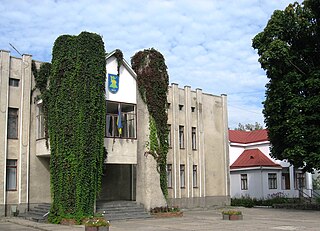
Manevychi is an urban-type settlement and the administrative center of Manevychi Raion in Volyn Oblast in the western Ukraine. Population: 10,725 (2020 est.)
Bruno Olbrycht was a soldier of the Austro-Hungarian Army and officer of the Polish Army both in the Second Polish Republic and postwar Poland. Born on 6 October 1895 in Sanok, Austrian Galicia, Olbrycht fought in Polish Legions in World War I, Polish–Ukrainian War, Polish–Soviet War and the Invasion of Poland. He died on 23 March 1951 in Kraków.
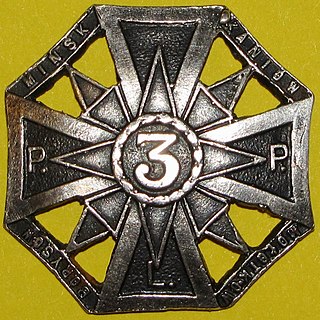
Third Legions Infantry Regiment was an infantry unit of Polish Legions in World War I, Polish Army and the Home Army. It existed in 1914–1939 and 1944–1945.
5th Legions Infantry Regiment of Józef Piłsudski was an infantry regiment of the Polish Army in 1918–1939. Garrisoned in the city of Wilno, it was part of the 1st Legions Infantry Division.

Maria Dulębianka was a Polish artist and activist, notable for promoting women’s suffrage and higher education.

















